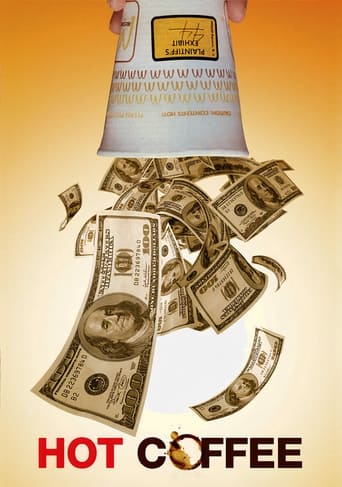dickmacgurn
I had been skeptical about watching this movie for a while, and then today I finally decided to give it a chance. My intuition was telling me there was at least a 50% chance I'd get 10 minutes in and then turn it off out of boredom. NOPE! Not only is the coffee story much more interesting than I ever imagined, they tell at least a dozen other stories that turn out to be even more interesting. This documentary turned out not only to be fascinating and educational but also deadly important. I very rarely give a 10 rating for documentaries but this one particularly affected me. I found myself saying, "WTF, are you kidding me!" throughout. Most importantly though, I felt that the producers worked very hard to bring us these interviews and make this film. As far as I know, it's the only film ever made primarily about what's really going on with the so called "Jackpot Justice" system we've been repeatedly warned about by the media. I'm sure a lot of people will feel the film is biased, but I really had to think about that and my conclusion is that they fairly represented all sides of every case. I would say they even went out of their way to get all sides for us. After watching this I am convinced that juries should decide what is fair compensation for damages, not lobbyists, and sadly, it seems to be going the other way due to a very well orchestrated campaign to miss-educate and disenfranchise American citizens.
gavin6942
How the infamous McDonald's hot coffee lawsuit (Liebeck v. McDonalds) and similar cases were exploited as part of a right wing crusade to weaken civil justice.First of all, and most importantly, this documentary clears up people's misunderstandings about the original incident and subsequent court case: we get to see nasty images, and hear of temperatures up to 190 degrees (almost boiling). By explaining the final outcome, we get a sense of the poor media portrayal of how the award process works. Despite how common knowledge sees it, this was not a "frivolous" lawsuit (although the judge was correct in reducing the jury award).We then see how this helped the cause and the rise of tort reform, a generally pro-business issue. More than any other case, Liebeck was the driving force that helped Rep. John Kasich of Ohio (later a governor), and I was not aware how many times President Bush had brought up the issue in various state of the union addresses (and elsewhere).The film goes off on some tangent issues, related in a contingent sense. We learn of Judge Oliver Diaz, which was possibly off-topic, but an interesting story in itself. He was targeted for his views opposing tort reform, and later had two criminal cases brought against him -- seemingly unfairly, as he was acquitted both times. It ruined his career.It was odd seeing Al Franken as a senator helping citizens after meeting him as a comedian. And how "mandatory arbitration" connects to "tort reform" is debatable...Although I think the film as a whole is fair and they make many good points (again, the best one being to clear up the misinformation on Liebeck), I am hesitant to give it a full endorsement. There seems to be very little attempt to get the point of view of the pro-reform folks. Even if the filmmakers think these people are wrong, it does not help the debate by cutting them out of the story.
TheDocHierarchy
How does big business turn a multi-million dollar pay-out into a substantial coup for industry and a devastating blow for the civil justice system? Quite easily, according to Susan Saladoff's 'Hot Coffee'.On February 27, 1992, Stella Liebeck, a healthy, active 72 year-old woman spilled a cup of boiling hot McDonald's coffee on her inner thigh. Suing McDonald's for damages, she was awarded $160,000 in medical damages and $2.7 million dollars in punitive damages by a jury; a trial judge would later reduce the award, and the two parties settled confidentially. In the meantime Liebeck and her cause were being pilloried by the nation's media - how, they said, could a company be liable for the mishandling error of a patron?Big business latched onto this wave of public opinion to condemn, in a widespread and well- financed media campaign, the rising tide of so-called 'frivolous lawsuits' eating away at the profits of all businesses. 'Tort reform' became the new catch-cry of this push - 'tort' meaning a 'harm' essentially - as industry used its leverage to encourage politicians, judges and the public alike to get behind new regulation that would make pay-outs like the one to Stella Liebeck a mere memory. The problem with this lies between the lines of the Liebeck case. Court photos detailing the extent of Liebeck's injuries - which required two separate skin grafts and over $100,000 worth of medical costs - are horrifying, as are the revelations that McDonald's had received over 700 unanswered complaints about the potential for injury with their standardized coffee temperature. That the jury came down so vehemently on the side of the plaintiff, and the corporation lowered their temperature standard in the wake of the case demonstrates not that this was not the 'frivolous' lawsuit painted in the media, but an appropriate and necessary use of the civil justice system.Not content to rest on this relative bombshell - I for one was embarrassed at my lack of knowledge of the Liebeck case - Saladoff charts how the case was used to systematically introduce US-wide 'tort reform', in the manner of both 'caps on damages' and 'mandatory arbitration' clauses in contract. These 'reforms' ensure that big business is protected from not merely the very few con artists seeking to extort them out of money (of which Liebeck is not one), but also the majority of whom have a reasonable and justified case to put forward to a civil court.The tragedy is this whole sage is not that Liebeck received such a pay-out, but that with these new misnomers of 'reforms', the likes of Liebeck are no longer sufficiently protected from the rich and powerful. Accountability is gradually being eroded, with the tacit consent of the people no less.Concluding Thought: How have I gone this long without knowing the context of the McDonald's case? Should I have been more diligent and found out myself, or can I blame the media?
Shawn
We as a people have to be aware of laws and public policy that is being influenced by big corporations through the use of/and because of money.Laws and public policy directly affect our freedoms as a people. This movie beautifully brings this to light, and uses a number of cases which illustrate corporate influence and just downright greedy behaviour.The narrative is interesting, entertaining and easy to follow. The "lawyer speak" is broken down so everyone can understand it.I highly recommend this movie! (PS. I WAS one of those "err she's suing over hot coffee?" people.. not any more!)









